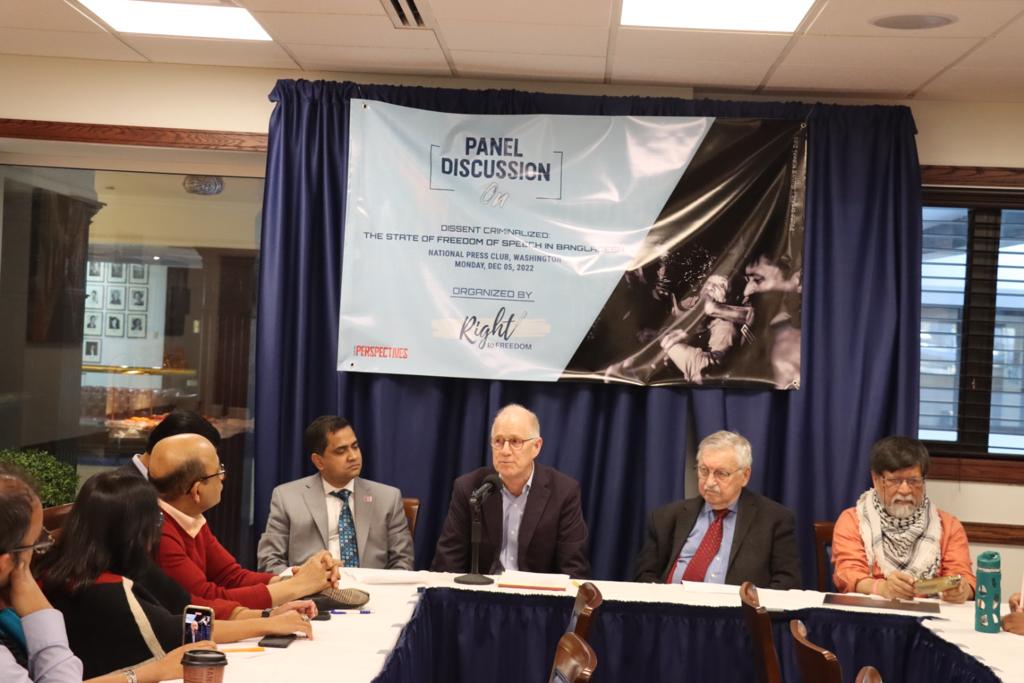R2F panel discussion on Dissent Criminalized: The State of Freedom of Speech in Bangladesh. DSA is a government tool used to silence journalists in Bangladesh

Key speaker Shahidul Alam thanked the organization Right to Freedom for hosting an event where he was able to speak about the human rights issues facing Bangladesh. He specifically praised White House correspondent Musfiqul Fazal for his tireless work in this area. However, Dr. Alam pointed out that the government recently filed a case against Mr. Fazal under the Digital Security Act (DSA).
Dr. Alam himself has experienced the consequences of speaking out against the government, as he was abducted and detained for 107 days by police claiming to be members of the detective branch of the Dhaka police. He was tortured and pressured to delete his Facebook post in exchange for release, but he refused.
According to Dr. Shahidul Alam, the DSA is a government tool used to silence journalists in Bangladesh. He stated that those arrested under the DSA often lose their jobs, scholarships, and even their studentships in universities or colleges. He also highlighted the irony that the government claims to use the DSA to stop disinformation, but is in fact the biggest player in using it against journalists.
Dr. Alam presented three specific cases of individuals who have been arrested under the DSA, including a 14-year-old boy who was arrested for a Facebook post against the Prime Minister, despite the fact that it was not even his own post but one that he had shared.
Dr. Steven Butler, CPJ’s former Asia Program Coordinator, began the discussion by stating that press freedom is an essential aspect of democracy and that the government of Bangladesh has effectively restricted it. He mentioned that a few years ago, editors of prominent newspapers in Bangladesh received phone calls from security forces instructing them on what to cover and what not to cover, which led to dangerous situations for the editors and staff of these newspapers. He also noted that individuals were disappearing and reappearing, but not speaking about their disappearances, and this fear was expressed to him even before the case of Dr. Shahidul Alam.
Dr. Butler also discussed the shortcomings of Section 57 with the Information Minister. He mentioned that the Minister acknowledged the widespread abuse of Section 57 by police and told him they are trying to find some new mechanism in the new DSA to stop it. But the reality is that the new DSA was implemented in 2018 without proper consultation with the media community.
He also shared some specific cases of horrific treatment of journalists, including Shahidul Islam Kajol who disappeared in March and reappeared blindfolded near the Indian border in June, and was jailed for seven months without bail. He was released in a broken condition, unable to work, and not speaking to anyone. He also mentioned the case of Rojina, a journalist who was arrested under the Official Secrets Act and her journalist accreditation card was revoked.
Dr. Butler also highlighted that the government is behaving in a barbaric way towards journalists who work overseas but whose families live in Bangladesh. He mentioned that the family members of Tasneem Khalil, Kanak Sarwar, Noor Alam Chowdhury, and Abudul Moktadir were recently arrested and harassed by security forces. He also mentioned the case of Mustaq Ahmed, who was tortured and died in jail and the government has not shared any information about his death or autopsy report.
During the Q&A portion of the panel discussion, Dr. Shahidul Alam spoke about the government’s control over freedom of expression and its surveillance of Bangladeshi citizens. He stated that the government controls the internet in order to increase its surveillance of social media, not only the internet but everything is under their control as well. He said that the government is forcing telecommunications companies to provide their customers’ SIM card numbers, which they then use to hack Facebook. Media outlets are not allowed to report on it due to self-censorship.

